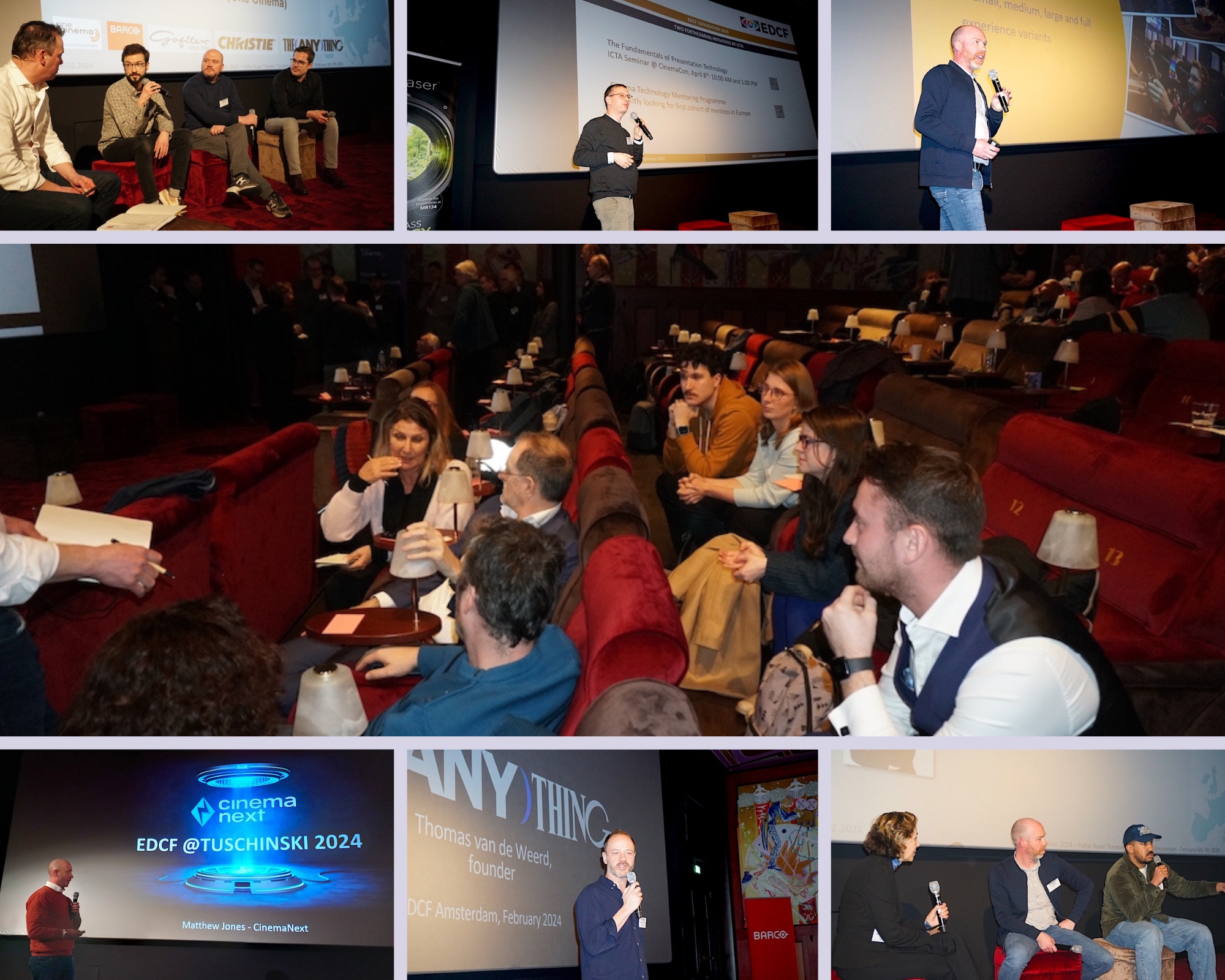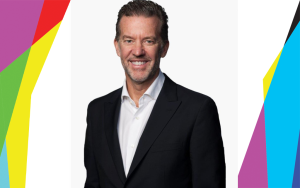The cinema of the future: from automation software to real-life experience
The panel discussion on “Cinema Software Tech and the View of Market Conditions“ featured insights from industry experts Guillaume Branders (DX), Till Cussmann (Vista), and Andreas Stier (OneCinema). The discussion touched upon various aspects of managing cinema operations through software and the challenges posed by market conditions.
The three panelists emphasized the importance of comprehensive cinema management through software that doesn’t operate in isolation but rather “talks to each other.” They stressed the need for interconnected systems to streamline operations from A-Z, offering a holistic solution for cinema management.
Andreas highlighted the critical role of a high degree of automation in cinema software stressing the significance of APIs and interconnectivity. This would entail benefits such as improved customer experience. Additionally, Till suggested that it is crucial not to try to be an expert in everything, citing examples like staff management tools, where building a new one may not be practical.
Till brought attention to the unique challenges of the niche cinema market. Unlike regular ticketing systems, cinema-specific providers need to consider specific factors. He also pointed out the risk associated with investing in entering a new market.
Andreas shared the need for developing automation solutions. The discussion touched on the financial challenges of providing complex software solutions in a market where there is an expectation for software to be low-cost (or even free). Guillaume confirmed that especially many independent theatres still still rely on Excel sheets or other outdated work tools that “do the job“.
Guillaume highlighted the global challenge faced by cinema software providers, noting that every country has different rules and regulations. This adds an additional layer of complexity to the development and implementation of cinema management software – an opinion shared by all panelists.
In summary, the panel discussion delved into the intricacies of cinema software technology, stressing the need for interconnected and automated solutions. The challenges of niche markets, investment risks, and the complexity of global variations in rules were also key points of consideration during the conversation.
Matthew Jones (Cinema Next) discussed focused on the upgrade to laser projection in the Netherlands, with a specific case study on the Pathé Royal Theater Tuschinski. The theater, known for its extreme projection angle and with less than half a meter of depth behind the screen, features a unique sound system utilizing Alcons speaker with a special framework and a Qsys system with centralized control program that allows management of audio, projector, server, and automation from a single platform, which includes an inbuilt mixing panel for convenience.
Matthew expanded the discussion providing insights into Lux arthouse with 8 screens. He touched upon the Dutch cinema landscape in general, consisting of around 280 cinemas and 1,075 auditoria, half of them run by major chains like Pathé, Vue, and Kinepolis. The remaining ones are independent cinemas and arthouses. Interestingly, two former prisons have been repurposed into cinemas.
The presentation also mentioned theaters integrating movies into their offerings, as well as hotels with a dedicated cinema room, such as Soho House in Amsterdam. His conclusion: “Forget the windmills and the tulips, go visit the cinemas”.
Bas Stolwijk (Pathé) briefly presented the history of Pathé group which opened their first cinema in the Netherlands in Scheveningen back in 1995. He then talked about the key highlights of 2023 with the opening of Pathé Ypenburg (The Hague) and the opening of the latest Go!Gaming location at Pathé Eindhoven.
He emphasized a shift in the concept of cinema towards becoming a local meeting place rather than a traditional movie theater. Bas highlighted the Go!Gaming joint venture with H20 in esports, featuring six Pathé locations in the Netherlands.
Additionally, the presentation touched upon the X-Cube experience, a digital escape room, and the development of Pathé Studios, an interactive experience building in Utrecht, showcasing Pathé’s commitment to innovative and immersive entertainment experiences beyond traditional cinema.
Training cinema staff and help industry talent grow
Jan Runge (International Cinema Technology Association) unveiled the new Cinema Technology Mentoring Program, aimed at fostering skill development and career guidance for those starting or at mid-level stages in cinema technology careers. He encouraged potential mentors and mentees throughout Europe to sign up for the forthcoming session. In addition, he highlighted ICTA’s latest educational offering in the United States titled “The Fundamentals of Presentation Technology”, scheduled for April 8th with sessions at 10 am and 1 pm, coinciding with CinemaCon in Las Vegas.
Subsequently, attendees were encouraged to engage in four concise breakout sessions. The purpose of these sessions was to facilitate collaborative ideation on potential services that trade associations such as the ICTA, EDCF, or UNIC might offer. The overarching aim was to swiftly compile preliminary concepts for initiatives that could satisfy the educational and developmental requisites in the field of cinema technology.
Sonia Ragone (UNIC) talked about the UNIC People Programme, which was launched in June 2023. The programme focuses on supporting cinemas facing challenges in recruiting, developing, and investing in their workforce. The aim is to help maintain the cinema industry’s position as an „employer of choice“.
The key work streams of the programme include internal culture and values, diversity, equity and inclusion, leadership skills, awareness of employment opportunities, as well as training and career progression. To disseminate information and engage with the industry, UNIC has employed multiple channels, including podcasts, webinars, and newsletters distributed to members and partners.
The presentation also highlighted upcoming activities, such as a webinar in March, a toolkit production in May/June, and the launch of the next topic, likely focusing on leadership skills, in June during CineEurope. Furthermore, UNIC conducted a survey on training and recruiting technical staff in cinemas, revealing a strong demand for training materials and courses in local languages. This emphasizes the need for localized resources to address the specific requirements of the industry.
Cinema Concepts and Alternative Content
Thomas van de Weerd (TheAnything) presented a groundbreaking concept aimed at enhancing the accessibility of movies. He highlighted the current cinema model, comparing it to linear television, where someone else determines the film schedule.
TheAnything introduces a revolutionary approach by enabling users to book accessible rooms through a mobile app, providing access to over 1,000 films, including both new releases and a comprehensive library. The platform goes beyond traditional cinema experiences by incorporating recommendations, food and beverage integration, and room controls.
Thomas emphasized the extension of TheAnything experience beyond traditional cinemas to various venues, such as restaurants and hotels. He cited the example of the Multiplex-Pathé Ypenburg, which opened in November of the previous year. The screening room at this multiplex averages 3.6 viewings per day. Currently, there are 10 cubes available in the Netherlands, Now in The Hague, Rotterdam and in Wijk bij Duurstede, enhancing the flexibility and accessibility of movie-watching experiences.
In conclusion, TheAnything presents a transformative approach to movies, breaking away from the conventional cinema model and expanding accessibility across different venues, creating a more personalized and immersive entertainment experience.
In the following presentation, Frank Groot (Kino Rotterdam) focused on the future perspective of arthouse cinemas in the Netherlands. Kino Rotterdam, an independent arthouse cinema, boasts six screening rooms, with an impressive 30% of its offerings comprising repertory titles.
Key to the success of independent arthouse cinemas like Kino Rotterdam is their collaboration with the association Cineville, a network encompassing 66 cinemas as of today. Foundation Cineville provides a subscription pass, facilitating access to a diverse range of arthouse cinemas. Despite the challenges posed by the Covid-19 pandemic, there is optimism surrounding the loyalty of audiences, which has remained strong even in the post-covid era.
The Cineville arthouse network is also successful beyond the Netherlands. Neighboring countries such as Belgium, Austria, and Germany have seen the launch of similar subscription passes run by Cineville.
During the presentation, specific wishes were highlighted to ensure the continued success and growth of independent arthouse cinemas. These include developing a PLF accessible for independents, granting independents access to content libraries, and the development of infrastructure that facilitates private cinema bookings. These aspirations align with the ongoing efforts to enhance the overall experience for audiences and foster the sustainability of arthouse cinema culture.
The official programming of the first day was concluded by an alternative content panel moderated by Cathy Huis in’t Veld-Esser who was joined by Bas Stolwijk (Pathé) and Steven Clerima (Kinepolis).
Bas defined alternative content as anything that could potentially draw a different audience than the usual cinema-goers. Steven brought up the notion of event cinema, emphasizing that alternative content doesn’t necessarily have to be live. Bas added that they often live stream events, with a distribution ratio of 40 live events to 60 events distributed in the Digital Cinema Package (DCP) format.
The conversation also touched on the role of booking teams, with Bas highlighting the existence of special teams dedicated to creating and organizing events to attract diverse audiences. Steven stressed on the importance of eventize screenings and create memorable experiences for the audience. Overall, the discussion centered around the strategies and considerations involved in presenting alternative content in cinemas, with a focus on live streaming, event cinema, and the efforts of specialized booking teams.
The first day then ended with dinner, drinks, and networking opportunities at Pathé Tuschinski’s VIP Room.
-to be continued-


